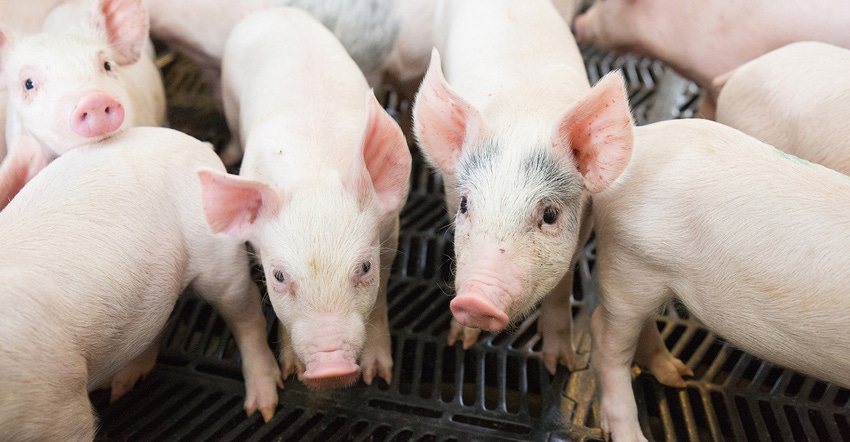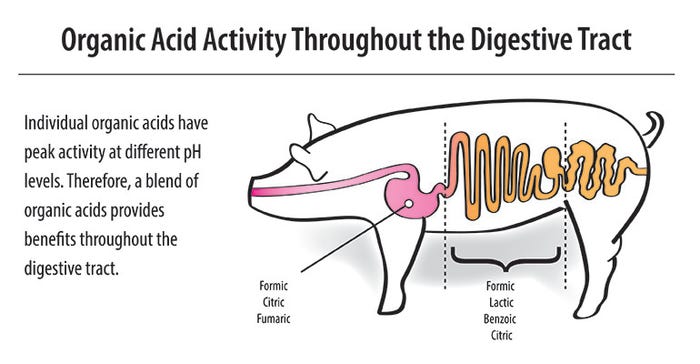The right acids at the right levels
Organic acids can improve young pig performance by helping optimize stomach pH after weaning and supporting gut health through modulation of microbial populations.
July 12, 2017

Sponsored Content
Getting pigs off to a good start immediately following weaning is critical. Minimizing the post-weaning lag period is essential to achieving high-performance rates in the nursery phase and beyond. During the transition from a milk-based diet to a solid diet, several physiological changes occur in newly weaned pigs. Organic acids are one tool that can be used to support gut health during this critical transition period.
Stomach pH and nutrient digestibility
Acid production in the stomach is low during the suckling period. Pigs rely primarily on bacterial fermentation to convert lactate from milk into lactic acid. After the transition to solid feed, acid production in the stomach is stimulated by intake. However, intake is inconsistent and often reduced, which can lead to an elevated stomach pH. Because some digestive enzymes, such as those responsible for protein digestion, are active at a lower pH range (2-3.5), the elevated stomach pH decreases digestive efficiency. Decreasing stomach pH improves overall nutrient digestibility with specific benefits for protein digestion. Scours may also be reduced or avoided as less undigested protein is fermented in the hindgut. Organic acids have been shown to effectively increase activity of specific digestive enzymes, improve protein digestibility, and formic, citric, and fumaric acids have been specifically shown to reduce stomach pH. Research has shown the addition of citric and fumaric acids individually can reduce stomach pH from around 5 to 2-2.5. While individual acids are capable of lowering stomach pH, research has indicated that using a combination of organic acids is a more effective approach because some acids are absorbed more quickly than others. Using a combination of acids allows for a rapid but sustained reduction in stomach pH.
Bacterial Growth
The immune system of the weaned pig is still rapidly developing and immature. Organic acids, at the proper inclusion levels, can kill certain bacteria and yeasts and sometimes prevent the growth of certain bacteria within the gut. Formic, benzoic, and sorbic acids are recognized for their direct anti-bacterial effects. Research has shown formic and lactic acids can reduce the growth of E. coli. Also, some organic acids, such as lactic acid, are capable of stimulating the growth of beneficial bacteria within the gut. A synergistic relationship has been observed when multiple organic acids that have been shown to reduce pathogen growth are used together. Reducing pathogen load in the gut leads to less competition for nutrients and less inflammation of the intestinal cells, allowing for improved nutrient absorption. Organic acids can also be a direct energy source for intestinal cells and support a faster recovery of intestinal cells following weaning.

Performance and Feed Efficiency
For optimal gut health, organic acids need to be active throughout the length of the digestive tract. Organic acids differ in the pH in which they are most active within the gut. Benzoic and sorbic acids are more active at higher pH levels, therefore effective in the hindgut, stimulating cell proliferation and inducing an anti-bacterial effect. Organic acids such as fumaric and citric acid are more active at lower pH levels, as in the foregut, also stimulating cell proliferation and inducing an anti-bacterial effect. A blend of organic acids, with each acid at the proper level, can provide benefits throughout the gastrointestinal tract, to promote gut health. Improving gut health and increasing nutrient absorption during the nursery period has been shown to improve performance and feed efficiency and set pigs up for long term success in the grow-finish period.
Promote® ProHacid® Advance
Promote® ProHacid® Advance is a uniquely formulated blend of organic acids that provides support for growth and optimal gut health and is backed by over a decade of research and field experience. The components of ProHacid Advance work in multiple ways, leading to improvement in digestibility and utilization of nutrients, and a more favorable microbial population throughout the gastrointestinal tract. These actions help to provide a beneficial environment that supports the pig’s overall gut integrity, normal development, and well-being in diets with or without antibiotics.
For more information on ProHacid Advance, contact your Provimi sales or nutrition representative or visit the Provimi website at www.provimius.com.
About the Author(s)
You May Also Like


